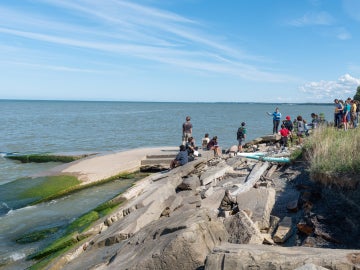Lessons from the Paris Peace Conference of 1919
September 20, 2018
Amanda Nagy

Leonard V. Smith is the Frederick B. Artz Professor of History.
Photo credit: Jennifer Manna
A historian of the First World War, Professor of History Leonard V. Smith’s newest book deepens the dialogue between history and international relations theory.
Leonard Smith spent the early part of his career writing and teaching about the First World War in France. As one of two scholars of Modern Europe in the Department of History, the Frederick B. Artz Professor of History teaches a First Year Seminar on the French Revolution, the history of the world wars, French colonialism, and more recently, a course on international relations theory.
His latest book, Sovereignty at the Paris Peace Conference of 1919 (Oxford University Press) is the product of Smith’s more recent interest in peacemaking and international history.
“After 25 years of writing about war and France, I decided to do something very different. I decided to write about making peace rather than war. And I decided to do a more international history rather than just France,” says Smith, who received his undergraduate degree from Oberlin in 1980.
While the Paris Peace Treaties of 1919-1920 “failed” in the sense that they did not prevent the outbreak of World War II, Smith’s research shows how they were instrumental in creating a new kind of international system.
The shift in his interests toward peacemaking unfolded when Smith was named William F. Podlich Distinguished Fellow at Claremont McKenna College in 2008. There, he developed a course called International Relations Theory for Historians, which he has subsequently taught twice at Oberlin.
“I tried hard in the book to rejuvenate the dialogue between history and international relations theory,” Smith says, “You would think that historians and political scientists would have a lot to say to each other, but in fact talk past each other a great deal. But each has a great deal to teach the other.”
With three previously published books, Smith was in the ideal point of his career where he could take up any new subject. Now in his 27th year at Oberlin, he finds himself in an interesting role reversal: Whereas early in his career the research led the teaching, with his latest project, the teaching precedes the research.
The release of the book also coincides with centenary of the end of World War I. (Events commemorating the beginning of the end of World War will continue through 2023.) He will lecture on the book at Yale University in November and at Harvard University in March 2019. In addition, he will present at centenary conferences in Italy, France, and Denmark.
In early September, Smith participated in a cross-campus celebration of artistic master works and hidden gems made in the shadow of WWI. Along with Andrea Gyorody, Ellen Johnson ‘33 Assistant Curator of Modern and Contemporary Art, he led a presentation at the Allen Memorial Art Museum (AMAM) about Ernst Ludwig Kirchner’s Self-Portrait as a Soldier (1915), considered one of the most iconic works of art created during World War I.

The AMAM acquired the painting in 1950. A landmark example of German Expressionism, Self-Portrait as a Soldier figures prominently in several of Smith’s courses. This fall, in his Europe 1900 to 1940 course, the class is making three visits to the museum to study the Kirchner, as well as works by Amedeo Modigliani and others in the Bissett collection.
“The periods I teach, the early 20th century, those were the times that the Allen was in a position to buy unbelievable pieces of art,” Smith says. “We had people in the right place and the right time who knew what they were doing. Our students have an extraordinary opportunity to learn from their efforts.”
Smith says his research has been very well supported at Oberlin, and he appreciates the latitude to teach what he wants.
“I think anyone who’s had a long career here will tell you that what keeps us going is the students—their curiosity and their energy,” he says. “There is nothing that I’ve wanted to accomplish professionally that I haven’t been able to do here at Oberlin.”
You may also like…
Research Roundup
Every day, Oberlin’s faculty and students produce scholarly work that uncovers new insights into how we understand the world, particularly in the areas of sustainability and the environment.
Interview: Jon Seydl, John G.W. Cowles Director of the Allen Memorial Art Museum
Get to know Jon Seydl, the new John G.W. Cowles Director of the Allen Memorial Art Museum at Oberlin.
The Body, The Host
An award-winning Allen Memorial Art Museum exhibition challenges the prevailing narrative of the 1980s HIV/AIDS epidemic.


